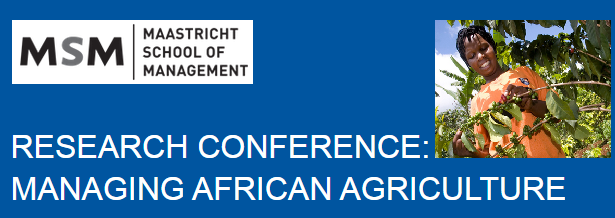
The Research Conference “Managing African Agriculture: Markets, Linkages and Rural Economic Development” is jointly organized by Maastricht School of Management, the German Development Institute and the Austrian Foundation for Development Research.The event aims to further policy-oriented research and debates on the topics – and specifically on the themes – listed below.
Background
Africa’s rural economies are set for a transformation, involving changes to both farming and non-farming activities. In this, agriculture will play the role as a key driver of growth and productivity, contributing to food security, job creation and exports. A precondition for this is advances in management and entrepreneurship in agriculture and agri-business as well as in value addition and linkages within agriculture and to non-agriculture sectors. Appropriate policies in these areas from governments, development agencies, donors and multinational companies will be key to ensure rural economic development.
Themes
Researchers were invited to submit their papers that could specially, but not exclusively, deal with:
- Transformations in rural economies on and off -farm: Changes in farm management or farm organization to upscale agricultural production, to make farm production better meet market demand, to increase sustainability and resilience of agriculture and to create rural economic development.
- Development of agro-industry clusters: Entrepreneurial initiatives that change the agri-business structure resulting in geographical concentration of input suppliers, agro-management services, trading firms, and especially food processors serving national, regional and international markets.
- Role of markets and value chains: Initiatives to upscale, improve and diversify agricultural production, processing and trade by firms that dominate agricultural value chains, including linkages to non-agriculture sectors.
- Role of price vulnerability: Mechanisms to ensure a high price share for farmers and deal with price risks and income (in-) stability in agricultural value chains.
The organizaers are especially interested in papers that consider the impacts of the above transformations on:
(a) The future role of smallholders;
(b) The degree to which innovative agribusiness can attract the young generation;
(c) Options for African nationals to enhance their influence on the agricultural transformation process.
- This event has passed.

